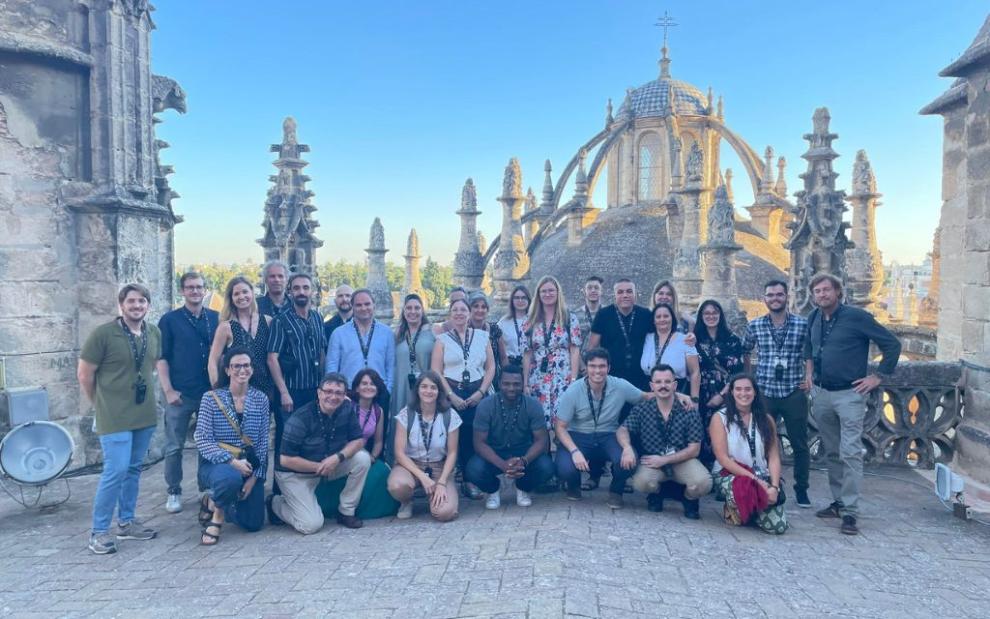The REWET consortium gathered in Seville, Spain, from October 1-2, 2024, for a productive meeting focused on advancing wetland conservation efforts across Europe.

The REWET consortium gathered in Seville, Spain, from 1 to 4 October 2024, for a productive meeting focused on advancing wetland conservation efforts across Europe. With participants from various institutions, the meeting featured presentations, discussions, and opportunities for collaboration among partners committed to the objectives of the REWET project.
Focus on Open Labs and Monitoring
The meeting commenced with a warm welcome from IDE, who outlined the agenda for the day. The first part of the session focused on Work Package 2 (WP2): Open Labs and Monitoring. Each partner presented an overview of their respective Open Labs, highlighting their unique contributions and approaches to wetland monitoring.
After a coffee break, discussions shifted to the social aspects of Open Labs, facilitated by KULeuven, underscoring the importance of community involvement in conservation efforts. The session wrapped up with a summary of WP2 and a discussion on the upcoming “Training of Trainers” event aimed at enhancing the skills of professionals in wetland conservation.
A working lunch allowed participants to network and engage further, leading into discussions on Work Package 3 (WP3), which focused on mapping wetland status across Europe, presented by IDE, WI-EA, and RSS. This was followed by insights into WP4 (Modelling) by FIC and IDE, and WP5 (Enabling Policies) by IUCN NL and BAX.
The day concluded with an evening visit to Seville’s magnificent cathedral, providing an opportunity for attendees to explore the local culture and history.
Business Models and Communication
During the second day, the focus turned to Work Package 6 (WP6), led by IDE, which covered replication and business models essential for sustainable wetland management. This was followed by a comprehensive discussion on Work Package 7 (WP7), focusing on communication, dissemination, and clustering strategies to enhance the visibility and impact of the REWET project.
After a coffee break, IDE led discussions on Project Management (WP1), addressing operational aspects and ensuring alignment among all partners. The meeting concluded with an open discussion summarizing key points, planning next steps, and addressing any other business matters.
Nature Restoration Law Training
The third day of the meeting, 3 October 2024, was dedicated to the hybrid event "Nature Restoration Law and Wetlands Conservation Training". This training aims to equip environmental professionals with the knowledge and skills necessary to promote wetland conservation effectively. Featuring a diverse array of expert speakers, the training will cover the ecological significance of wetlands, restoration techniques, and critical legislative frameworks such as the Nature Restoration Law. The presentations will be soon accessible here.
The training continued in the afternoon with a session dedicated to round tables. REWET partners and the training speakers split into three roundtables, each addressing a vital theme: Business Models, led by Lisa Wiatschka from BAX, which examined sustainable economic frameworks; Social Engagement, facilitated by Patrick Graf from KU Leuven, emphasizing the importance of community involvement in conservation efforts; and Policy, moderated by Odette Gonzalez from WI-EA, who discussed the role of policy in enhancing wetland restoration initiatives. A
The session concluded with a summary of the discussions, allowing participants to reflect on insights gained and how they might apply these in their own contexts.
The collaborative spirit continued on day 4, where REWET partners and the speakers of the training travelled to one of the most important wetlands of the European continent, the Doñana national park.
This event underscored the consortium's commitment to driving effective wetland conservation strategies across Europe.
Conclusion
The REWET consortium meeting in Seville was a significant step forward in fostering collaboration among partners dedicated to wetland conservation. By sharing knowledge, experiences, and strategies, the consortium aims to enhance the impact of its initiatives and drive meaningful change in wetland protection across Europe. Stay tuned for future updates and opportunities to get involved in REWET's future activities.